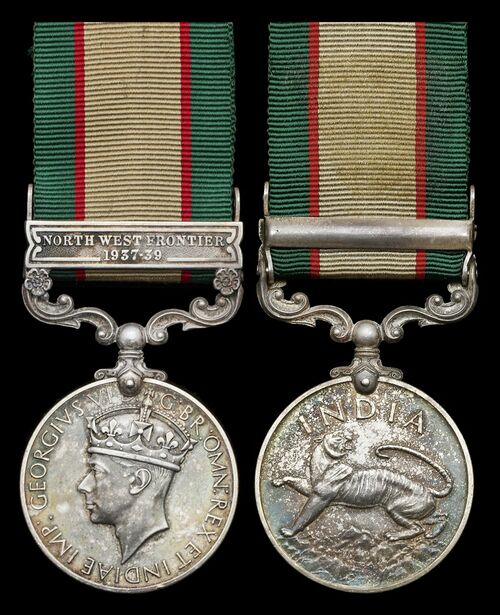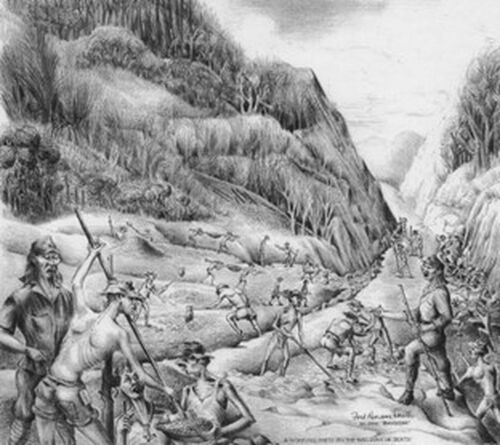Auction: 23003 - Orders, Decorations and Medals
Lot: 61
'At seven in the morning, on 1 January 1942, Kawamura launched his main attack against the western side of the Kampar position. This attack was carried out by the 41st Regiment and the brunt of it was against the area held by Lieutenant-Colonel Esmond Morrison's British Battalion. The 41st Regiment attacked straight into the British Battalion's positions, supported by heavy mortar fire. The fighting became fierce with Japanese and British positions taken and retaken at the point of a bayonet. Japanese casualties were heavy with a continuous stream of wounded passing Colonel Okabe's headquarters. Combined with the infantry assaults the Japanese poured continuous artillery fire and bombed and strafed the British positions with impunity (the Japanese had nearly complete air superiority by this stage in the campaign). Matsui brought in fresh soldiers to replace his mounting casualties …
The ferocity and confusion of the close-quarter fighting around the British Battalion was especially violent in the forward positions. Lieutenant Edgar Newland, commanding a platoon of 30 Leicesters, held the most forward position of the battalion. His platoon was surrounded and cut off for most of the battle but Newland and his men fought off all attacks and kept hold of their isolated position throughout the two days. For his actions Newland later received the Military Cross … '
Hell on earth: the "British Battalion's" stand at Kampar in January 1942, among their ranks a fellow 'Leicester', Sergeant Roland Baxter.
An outstanding inter-war India General Service Medal awarded to Sergeant R. Baxter, Leicestershire Regiment, a soldier of the gallant "British Battalion" prior to his capture at the fall of Singapore in February 1942
As recounted by Lieutenant-General Sir Lewis Heath, 'The British Battalion, despite casualties which would have shattered the morale of any unit not imbued with the grandest spirit, continued to fight on, solidly and undismayed, till the very end … '
India General Service 1936-39, 1 clasp, North West Frontier 1937-39 (839022 L./Cpl. R. Baxter, Leic. R.), good very fine
Roland Baxter was born in Grimsby, Lincolnshire on 28 January 1917 and enlisted in the Leicestershire Regiment in 1934.
Having witnessed active service on the North-West Frontier as a junior N.C.O. in the late 1930s, he was embarked for Singapore with the 1st Battalion, and it was in that capacity, as a Sergeant in 'D' Company - and afterwards in the newly formed "British Battalion" - that he was taken P.O.W. on 15 February 1942.
As is well-known, the 1st Leicesters sustained heavy losses in the battle of Malaya, so much so that they were amalgamated - in late December 1941 - with the 2nd Battalion, East Surreys, to form the "British Battalion". Commanded by Lieutenant-Colonel C. E. Morrison, O.B.E., M.C., of the Leicesters, the new unit subsequently performed prodigious acts of gallantry, winning the admiration and respect of all. That gallantry - as cited above - was especially notable in the desperate four-day engagement fought at Kampar in December 1941-January 1942.
The British Battalion subsequently took part in the retreat southwards to Singapore, where it fought with equal courage up until General Percival's surrender in February 1942. Of the battalion's estimated strength of some 500 men, barely 130 survived the war. That sacrifice - and the battalion's part in the Malaya campaign and in captivity - invariably form a prominent chapter in countless published accounts of the campaign.
The Railway of Death
Baxter subsequently endured the deprivations of a shocking four-day cattle-truck railway journey to Thailand in October 1942. Far worse was to follow.
On arrival at his new place of captivity at Tonchan, he and eight fellow "Tigers" were allocated to Y2 Party in Group IV on the "Railway of Death". Charged with constructing 60 kilometres of line, resultant fatalities were high. Five of his Leicester comrades died from disease and ill-treatment, a story of suffering immaculately recounted in the pages of Ken Hewitt's Tigers in Captivity.
Baxter was subsequently transferred - in July 1944 - to a working party at Pratchai, 80 kilometres from Bangkok, where he faced further hard labour constructing hillside bunkers and gun emplacements.
The extent of his suffering is likely reflected in his early demise back in Grimsby - in his mid-50s - in February 1972.
Subject to 20% VAT on Buyer’s Premium. For more information please view Terms and Conditions for Buyers.
Sold for
£240
Starting price
£160









